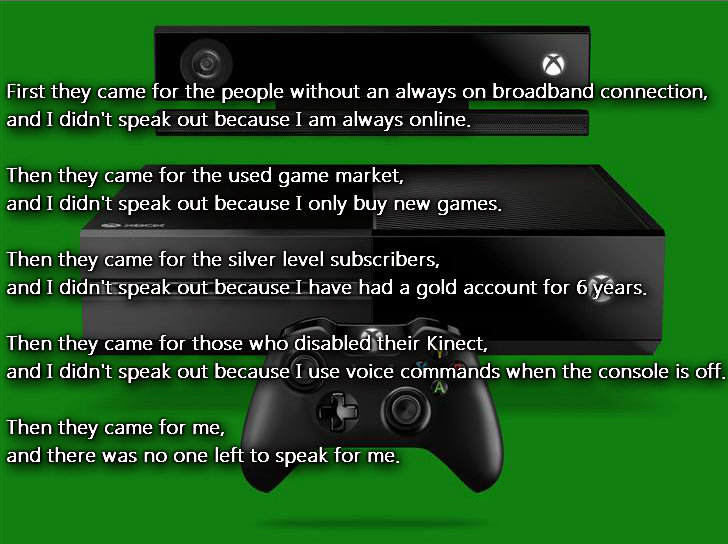It has always been said that one voice can make a difference. Many have heard this before, but few this day and time believe it to be true. That is, until this entire PS4 vs. Xbox One controversy started, continuing its flame spread from E3 2013 last week.
The Evolution of the Xbox One Controversy
Contents
Since the end of E3, 2013, gamers across the Internet have used social media as a way to publicize their feelings about Microsoft’s newest game restrictions: 1) the once-an-hour Internet logon, and 2) the one-sell game policy. The worst response I’ve ever seen came this week, with quite a few individuals taking to Microsoft’s Facebook page to voice their responses to Microsoft’s new Xbox game restrictions. While there were a few Microsoft supporters here and there, the dissenters drowned them out.
To add insult to injury, Xbox One sales were minuscule compared to the number of PS4 game consoles that sold at Amazon. In fact, the PS4 outsold the Xbox One at Amazon two-to-one, with the Xbox One still available at the moment.
Sony’s impressive pre-order sales only added fuel to the fire: apparently, gamers felt the need to “put their money where their mouths were” and show Microsoft that the consumer has a little power too: the power of the dollar. When it comes to the dollar, that which companies need to stay in business, companies like Microsoft cannot afford to gamble with their futures by placing “a vision for the future” ahead of their customers.
Microsoft Withdraws Its New Xbox One Requirements
The result of social media banter and high pre-order sales for Sony’s PlayStation 4 is that Microsoft withdrew its new Xbox One game restrictions. According to Microsoft’s Marc Whitten, customer protest won out:
What we’ve herd is that people love our games, love the entertainment experience. Frankly they love the vision of what Xbox is. But they’ve also told us very clearly that they want choice. They want the choice to use their games on physical discs just like they always have, and they want to be able to use their Xbox when they connect to the internet. And we listened.
Xbox President Don Mattrick made the announcement regarding the selling and trading of physical games, stating that gamers can now “trade-in, lend, resell, gift, and rent disc based games just like you do today.” Apart from removing the trading/selling and Internet login restrictions, Microsoft also removed its regional restriction on the games. If you remember, the regional restriction would not allow the Xbox One and its games to operate outside of North America (US and Canada).
While Microsoft had been intent on moving gamers into the future and into Microsoft’s overarching vision for its gaming division, it is even more intent on giving customers what they want — which is what you would expect of a business in a consumer-driven market.
Consumer Responses to Xbox One Restriction Withdrawals
David Pierce of The Verge feels that Microsoft’s Xbox One restriction reversal is a step back into the present, one that goes against the company’s goal:
Only a week ago, Microsoft seemed to believe that an always-on, always-listening, always-connected experience was also critical to the evolution of the gaming experience. But now, by offering buyers the option to game nearly the same way they did in 2005, it’s turned a bold, next-gen console into something that feels all too familiar.
As for Engadget’s Ben Gilbert, he notes that there are benefits to the Xbox One restriction reversal:
There are some bizarre added benefits of the new system, as well. One disc can act as a copy for several people, at least on the install. “If I had a physical version of my game and I went to your house, we played, and then I left with my game, you could actually buy the game instantly with no download,” he told us. Since the Xbox One automatically rips disc-based games to its HDD, it essentially installs games on any box you play them on.
What are the disadvantages of reverting to the old system? Gilbert again:
Though gamers won’t have to put up with the requirements for an internet check-in every 24 hours, some lauded features we’d heard about will not be available as a result — at least at launch. That includes the sharing between up to ten family members, and playing disc-based games without having the disc in the [Xbox] One. It also means new consoles will need a patch at launch to enable this future/ past scenario of disc-based console gaming.
Xbox One Restriction Reversal Shows the Power of the Human Voice
Believe it or not, Microsoft reversed its Xbox One game policies and geographic restrictions because of the consumer voice. Consumers made it known that they disagreed with Microsoft’s policies, and Microsoft was forced to listen.
Some may believe it is a step back, but we have to remember the following: just because some individuals are in the future with high-tech internet service and 4G LTE does not mean that everyone is there yet. America is still one of the most advanced countries on earth, and there are other countries that do not have the resources America does.
Microsoft needs to be more than just an American console; it needs to become a console for the world. In order to do that, however, Microsoft needs to take a step back and consider the world’s “less fortunate” in its gaming agenda.
By allowing physical games to be traded and sold as before, while allowing others to purchase digital copies, Microsoft is giving each consumer a palette of choices. This is more in-step with the consumer-driven market than to restrict or erase choice altogether. The Xbox One’s former restrictions, as forward-thinking as they may have been, were a step in the wrong direction.
What do you think of Microsoft’s Xbox One requirement reversal? Let us know in the comments.



